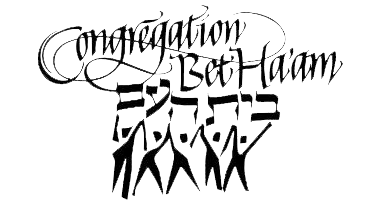by Rabbi Jared H. Saks
As I write this, it’s the end of April and I was supposed to have completed this piece weeks ago, but I’ve found myself unable to find the words or even the message I want to convey to you. I am, I imagine like you, struggling to find meaning in this moment in our lives. In the background, I can hear Dr. Nirav Shah and Gov. Janet Mills providing the most recent update on the COVID-19 crisis and its impact in Maine. While much of my rabbinate involves writing, ranging from sermons to weekly words of Torah to these articles for Chadashot and so many other pieces, I don’t really consider myself a writer and in this moment feel that I lack the words to address the current situation and offer the comfort that I feel a responsibility to provide you. Nonetheless, I’ll give it my best.
In our prayer book, Mishkan T’filah, there appears a setting for Kaddish written by Rabbi Richard Levy. It opens, “It is hard to sing of oneness when the world is not complete.” This opening line, I believe, is a callback to the Sh’ma, our declaration of God’s unity in the world and our unity with God: Hear, O Israel! Adonai is our God and Adonai is One. In all the tumult of life and of Jewish life in particular, the Sh’ma remains a steadfast declaration of the unity in the world. Rabbi Levy acknowledges that in our times of greatest grief, it can feel nearly impossible to sense that oneness. And his sentiments capture where I am at this moment. I feel broken. The world feels incomplete. It’s hard for me to sing of oneness.
Still, I maintain hope. I believe that we will once again be able to gather, even if it takes a long time and even if when we do it’s different than what it used to be. I was moved by one of the things that our Governor said in her address about the crisis today. She noted the empty spaces that we’re used to occupying, among them our sanctuaries. It is the people that make our spaces special, Governor Mills indicated. It’s true. There is a great deal of beauty in the physical space of our sanctuary, but that’s not what makes it a beautiful space. We are what makes it beautiful. The beauty of our congregation is in its people.
That has what has given me hope these past six weeks. I have loved watching the comments on our livestreamed worship and seeing members of our community from near and far–as far away on some Shabbats as Florida and Washington states–join together in worship. I’ve seen our members step up in new and remarkable ways to support one another.
There will be a lot to grieve when this crisis is behind us. In all reality, that will be a long time. We may have some respite this summer, but experts predict that we may see a resurgence in the fall and will continue to grapple with COVID-19 until a vaccine has been produced and is widely available. But there will also be a lot to celebrate, notably how we’ve supported one another and how, in the wake of this crisis, we have reinvented what it means to be a congregation.
Later in his piece, Rabbi Richard Levy writes, “We do best homage to our dead when we live our lives more fully, even in the shadow of our loss.” There is a lot that we will have lost, most substantially loved ones who will not survive this pandemic. At the same time, I expect there is a lot we will gain. We can measure what we’ve gained by how much we are ready, willing, and able to live our lives more fully, even in the shadow of our loss.
Photo by Rodion Kutsaev on Unsplash

